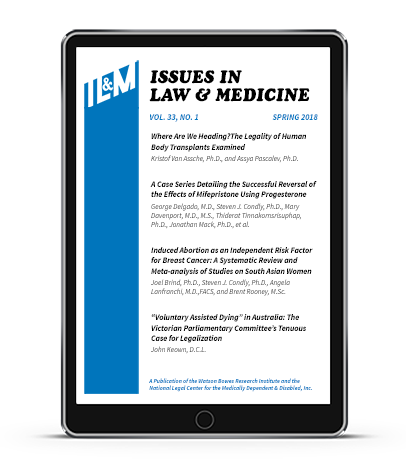 A journal has temporarily removed a study by a researcher who has long championed a highly controversial “abortion reversal” method over concerns about its ethical approval.
A journal has temporarily removed a study by a researcher who has long championed a highly controversial “abortion reversal” method over concerns about its ethical approval.
The study, “A Case Series Detailing the Successful Reversal of the Effects of Mifepristone Using Progesterone,” appeared in Issues In Law And Medicine in April. Its first author, George Delgado, is the medical director of Culture of Life Family Services, which operates a ‘‘crisis pregnancy center,’ according to a 2017 New York Times Magazine article about “abortion-pill reversal.”
Medical abortion consists of two pills, mifepristone and misoprostol, taken some time apart. In order to see if its effects could be undone, here’s what the authors of the withdrawn study say they did:
Subjects were pregnant women from across the United States and from several other countries who had taken mifepristone, but had not yet taken misoprostol, and were interested in reversing its effects. Subjects called an informational hotline linked to an informational website and staffed by nurses and a physician assistant. After receiving information about the reversal process, those who decided to proceed with reversal were referred to physicians and mid-level practitioners in their respective geographic areas for treatment.
The study, which caught the notice of The Washington Post and other outlets, concluded:
The reversal of the effects of mifepristone using progesterone is safe and effective.
However, the page where the paper used to appear now reads:
This article has been temporarily withdrawn pending technical corrections.
Neither the journal nor Delgado responded to requests for comment. Thomas Herrinton, provost of the University of San Diego (USD), where two of the authors have faculty appointments, tells Retraction Watch:
USD requested that the authors withdraw this paper and submit a corrected version for publication because the wording regarding [Institutional Review Board] approval in the paper was ambiguous, leading many readers to incorrectly conclude that the USD IRB had reviewed and approved the entire study. In fact, what came before our IRB was an application to do a retrospective analysis of de-identified data from the study. This application was approved under exemption (4) in 45 CFR 46:
(4) Research involving the collection or study of existing data, documents, records, pathological specimens, or diagnostic specimens, if these sources are publicly available or if the information is recorded by the investigator in such a manner that subjects cannot be identified, directly or through identifiers linked to the subjects.
Here is the wording from the paper regarding IRB approval:
This was an observational case series with data analysis that received an institutional review board waiver.33
The “33” reference is to the Institutional Review Board at the University of San Diego, San Diego, CA.
Part of a strategy?
Regardless of the state of ethical approval for the study, Delgado and his colleagues “have been making claims that vastly overstate what their studies can possibly show,” according to Kelly Cleland, of the Office of Population Research at Princeton University. The approach “seems to be a strategy of the anti-abortion movement, particularly at the level of state policies that require health care professionals to tell women that abortion can be reversed,” she said, which “does not have a solid scientific basis and undermines the patient-provider relationship.”
Indeed, the journal appears to have ties to the anti-abortion movement. Earlier this year, Splinter News described the journal this way:
As indicated on its website, Issues [in] Law and Medicine is co-sponsored by the National Legal Center for the Medically Dependent & Disabled—a group founded by anti-choice attorney James Bopp Jr.—as well as the Watson Bowes Research Institute, a member of the National Association for Pro-Life Obstetricians & Gynecologists. If you’re interested in reading more about how Issues obscures its links to the anti-choice movement and influences policy, Rewire ran an excellent summary recently.
Cleland argues that the study doesn’t even provide compelling data that the technique can reverse medical abortions:
In this study, women were given one of ten different regimens of progesterone after having taken the first drug in the medication abortion protocol (mifepristone), and evaluated to see if their pregnancy continued. On its own, mifepristone is not nearly as effective as it is when followed by misoprostol, so some of what the authors claim as success of their regimen is simply due to expected failures when using mifepristone alone.
It’s possible the authors excluded women who had already been determined to not be pregnant anymore, Cleland added:
[T]he authors did not appear to include all patients who presented to them in their denominator; therefore the success rate [of abortion reversal] is very likely inflated. Although it’s not entirely clear from the methods described in the paper, it appears that some women (but not all) received an ultrasound prior at their intake, and women without a continuing pregnancy were not treated with one of the progesterone regimens. While this makes sense clinically, the problem is that women who did not have ongoing pregnancies were not counted in the final calculations; only women with continuing pregnancies were included. This does not allow one to determine a true success rate of a therapy, because it fails to include the whole universe of women who started the medication abortion process.